Welcome to The Book Corner. In each March and October issue, we feature books recently published by Oxford University Press in the five AAR/OUP book series. The books featured in this issue were published between October 2012 and July 2013. The full list of AAR titles published by OUP may be found here.
Muslims and Others in Sacred Space
Margaret Cormack
AAR Religion, Culture, and History Series
Oxford University Press, 2012.
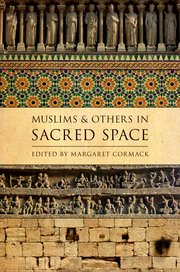 This collection of seven essays offers wide-ranging and in-depth studies of locations sacred to Muslims, of the histories of these sites (real or imagined), and of the ways in which Muslims and members of other religions have interacted peaceably in sacred times and spaces.
This collection of seven essays offers wide-ranging and in-depth studies of locations sacred to Muslims, of the histories of these sites (real or imagined), and of the ways in which Muslims and members of other religions have interacted peaceably in sacred times and spaces.
After a theoretical introduction by Peter Gottschalk, David Damrel discusses historic and modern controversies surrounding Muslim practices at shrines in South Asia. Lance Laird presents a case study of a shrine holy to Palestinian Christians, who identify its patron as St. George, as well as to Palestinian Muslims, who believe that its patron is al Khadr/Khidr. Ethel Sara Wolper illustrates how al Khidr's patronage was used also to show Muslim connections to Christian sites in Anatolia, and JoAnn Gross's essay explores oral and written  traditions linking shrines in Tajikistan to traditional Muslim locations and figures. A chapter by the late Thomas Sizgorich examines how Christian and Muslim authors used monastic settings to reimagine the relationship between the two religions, and Alexandra Cuffel offers a study of attitudes towards the mixing of religious groups in religious festivals in eleventh- to sixteenth-century Egypt. Eric Ross shows how the Layenne Sufi order incorporates a singular combination of Christian and Muslim figures and festivals in its history and practices. Muslims and Others in Sacred Space will be an invaluable resource to anyone interested in the complex meanings of sacred sites in Muslim history.
traditions linking shrines in Tajikistan to traditional Muslim locations and figures. A chapter by the late Thomas Sizgorich examines how Christian and Muslim authors used monastic settings to reimagine the relationship between the two religions, and Alexandra Cuffel offers a study of attitudes towards the mixing of religious groups in religious festivals in eleventh- to sixteenth-century Egypt. Eric Ross shows how the Layenne Sufi order incorporates a singular combination of Christian and Muslim figures and festivals in its history and practices. Muslims and Others in Sacred Space will be an invaluable resource to anyone interested in the complex meanings of sacred sites in Muslim history.
ISBN: 9780199925049
Writing Religion: The Making of Turkish Alevi Islam
Markus Dressler
AAR Reflection and Theory in the Study of Religion Series
Oxford University Press, 2013.
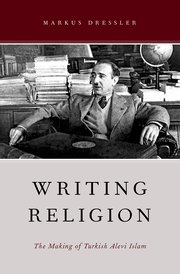 In the late 1980s, the Alevis, at that time thought to be largely assimilated into the secular Turkish mainstream, began to assert their difference as they never had before. The question of Alevism's origins and its relation to Islam and to Turkish culture became a highly contested issue. According to the dominant understanding, Alevism is part of the Islamic tradition, although located on its margins. It is further assumed that Alevism is intrinsically related to Anatolian and
In the late 1980s, the Alevis, at that time thought to be largely assimilated into the secular Turkish mainstream, began to assert their difference as they never had before. The question of Alevism's origins and its relation to Islam and to Turkish culture became a highly contested issue. According to the dominant understanding, Alevism is part of the Islamic tradition, although located on its margins. It is further assumed that Alevism is intrinsically related to Anatolian and  Turkish culture, carrying an ancient Turkish heritage, leading back into pre-Islamic Central Asian Turkish pasts.
Turkish culture, carrying an ancient Turkish heritage, leading back into pre-Islamic Central Asian Turkish pasts.
Dressler argues that this knowledge about the Alevis—their demarcation as "heterodox" but Muslim and their status as carriers of Turkish culture—is in fact of rather recent origins. It was formulated within the complex historical dynamics of the late Ottoman Empire and the first years of the Turkish Republic in the context of Turkish nation-building and its goal of ethno-religious homogeneity.
ISBN: 9780199969401
Image, Identity, and the Forming of the Augustinian Soul
Matthew Drever
AAR Academy Series
Oxford University Press, 2013.
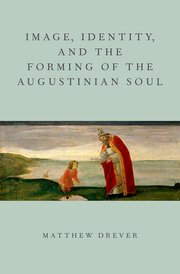 In our current pluralist context, there is no clearly designated means of valuing or defining the human person. Matthew Drever shows that in the writings of St. Augustine we find a concept of the human person that is fluid, tenuous, prone to great good and great vice, and influenced deeply by the wider spiritual and material environment. Through an examination of his account of the human relation to God, Drever demonstrates how Augustine can offer a crucial resource for a religious reorientation and revaluation of the human person.
In our current pluralist context, there is no clearly designated means of valuing or defining the human person. Matthew Drever shows that in the writings of St. Augustine we find a concept of the human person that is fluid, tenuous, prone to great good and great vice, and influenced deeply by the wider spiritual and material environment. Through an examination of his account of the human relation to God, Drever demonstrates how Augustine can offer a crucial resource for a religious reorientation and revaluation of the human person.
Drever focuses particularly on the concepts of the imago dei and creatio ex nihilo, significant for their influence on Augustine's understanding of the human person and for their potential to bridge his and our own world. Though rooted in Augustine's early work, these concepts are developed fully in his later writings: his Genesis commentaries and On the Trinity in particular.  Drever examines how in these later writings the origin (creatio ex nihilo) and identity (imago dei) of the human person intersect with Augustine's understanding of creation, Christ, and the Trinity. Image, Identity, and the Forming of the Augustinian Soul constructs an interpretation of Augustine's view of the person that acknowledges its classical context while also addressing contemporary theological and philosophical appropriations of Augustine and the issues that animate them.
Drever examines how in these later writings the origin (creatio ex nihilo) and identity (imago dei) of the human person intersect with Augustine's understanding of creation, Christ, and the Trinity. Image, Identity, and the Forming of the Augustinian Soul constructs an interpretation of Augustine's view of the person that acknowledges its classical context while also addressing contemporary theological and philosophical appropriations of Augustine and the issues that animate them.
ISBN: 9780199916337
Liberalism versus Postliberalism: The Great Divide in Twentieth-Century Theology
John Allan Knight
AAR Academy Series
Oxford University Press, 2012.
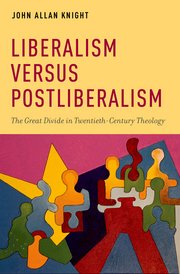 The divide between liberal and postliberal theology is one of the most important and far-reaching methodological disputes in twentieth-century theology. Their divergence in method brought related differences in their approaches to hermeneutics and religious language. This split in the understanding of religious language is widely acknowledged, but rigorous philosophical analysis and assessment of it is seldom seen.
The divide between liberal and postliberal theology is one of the most important and far-reaching methodological disputes in twentieth-century theology. Their divergence in method brought related differences in their approaches to hermeneutics and religious language. This split in the understanding of religious language is widely acknowledged, but rigorous philosophical analysis and assessment of it is seldom seen.
Liberalism versus Postliberalism provides such analyses, using the developments in analytic philosophy of language over the past forty years. The book provides an original reading of the "theology and falsification" debates of the 1950s and 60s, and Knight's interpretation of the debates supplies a philosophical lens that brings into focus the centrality of religious language in the methodological dispute between liberal and postliberal theologians. Knight suggests that recent philosophical developments reveal problems with both positions and argues for a more inclusive  method that takes seriously the aspirations of the debaters. His book makes an important contribution to contemporary theological method, to the understanding of liberal and postliberal theologies, and to our understanding of the role of analytic philosophy in contemporary theology and religious studies.
method that takes seriously the aspirations of the debaters. His book makes an important contribution to contemporary theological method, to the understanding of liberal and postliberal theologies, and to our understanding of the role of analytic philosophy in contemporary theology and religious studies.
ISBN: 9780199969388
Beyond the Walls: Abraham Joshua Heschel and Edith Stein on the Significance of Empathy for Jewish-Christian Dialogue
Joseph Palmisano
AAR Academy Series
Oxford University Press, 2012.
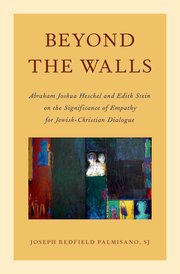 Joseph Palmisano offers an in-depth examination of the significance of empathy for Jewish-Christian understanding. Drawing on the writings of Rabbi Abraham Joshua Heschel (1907–1972) and Edith Stein (1891–1942), he develops a phenomenological category of empathy defined as a way of "re-membering" oneself with the religious other.
Joseph Palmisano offers an in-depth examination of the significance of empathy for Jewish-Christian understanding. Drawing on the writings of Rabbi Abraham Joshua Heschel (1907–1972) and Edith Stein (1891–1942), he develops a phenomenological category of empathy defined as a way of "re-membering" oneself with the religious other.
Palmisano follows Heschel's and Stein's philosophical theory and praxis through the unprecedented horrors of the Shoah, showing that Heschel's call to Christians for a return to God is an ecumenical call to humanity to embrace perceived others: a call to live life as a response to God's pathos. This call finds a prophetic answer in Edith Stein's witness of empathy when faced with the Shoah. Stein, a Catholic, creates a dialectical bridge with the Jewish "other," neither distancing herself nor denying her Jewish roots. Stein's simultaneously Jewish and Christian fidelity is a model for  interreligious relations. It is also a challenge to Catholics to remember their religion's Jewish heritage through new categories of witnessing and belonging with others. Beyond the Walls is a critical contribution to the fostering of interreligious understanding, offering both a model of the ideal Jewish-Christian relationship in Heschel and Stein and criteria by which to evaluate contemporary initiatives and controversies concerning interreligious dialogue.
interreligious relations. It is also a challenge to Catholics to remember their religion's Jewish heritage through new categories of witnessing and belonging with others. Beyond the Walls is a critical contribution to the fostering of interreligious understanding, offering both a model of the ideal Jewish-Christian relationship in Heschel and Stein and criteria by which to evaluate contemporary initiatives and controversies concerning interreligious dialogue.
ISBN: 9780199925025
Types of Pentecostal Theology: Method, System, Spirit
Christopher Stephenson
AAR Academy Series
Oxford University Press, 2012.
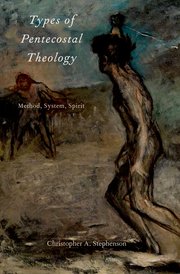 In the first critical study of the major theologians of pentecostalism, one of the fastest growing and most influential religious traditions in the world, Christopher A. Stephenson establishes four original categories to classify pentecostal theologians' methodologies in systematic/constructive theology. The four categories are based respectively on: the arrangement of biblical texts; the relationship between theology and Christian spirituality; doctrine concerning the kingdom of God; and pneumatology as a basis for philosophical and fundamental theology. Stephenson analyzes each methodological type and
In the first critical study of the major theologians of pentecostalism, one of the fastest growing and most influential religious traditions in the world, Christopher A. Stephenson establishes four original categories to classify pentecostal theologians' methodologies in systematic/constructive theology. The four categories are based respectively on: the arrangement of biblical texts; the relationship between theology and Christian spirituality; doctrine concerning the kingdom of God; and pneumatology as a basis for philosophical and fundamental theology. Stephenson analyzes each methodological type and  suggests a pentecostal theological method that builds on the strengths of each. He then offers his own, original contribution, arguing for a reciprocal relationship between pentecostal spirituality and doctrine that follows the pattern of lex orandi, lex credendi, and develops a doctrine of the Lord's supper as a demonstration of this reciprocal relationship.
suggests a pentecostal theological method that builds on the strengths of each. He then offers his own, original contribution, arguing for a reciprocal relationship between pentecostal spirituality and doctrine that follows the pattern of lex orandi, lex credendi, and develops a doctrine of the Lord's supper as a demonstration of this reciprocal relationship.
Types of Pentecostal Theology provides critical insight into such fundamental issues as the relationship between theology and philosophy, the dynamic between scripture and tradition, and the similarities and differences between recent pentecostal theology and other currents in contemporary theology.
ISBN: 9780199916795
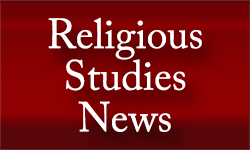

 This collection of seven essays offers wide-ranging and in-depth studies of locations sacred to Muslims, of the histories of these sites (real or imagined), and of the ways in which Muslims and members of other religions have interacted peaceably in sacred times and spaces.
This collection of seven essays offers wide-ranging and in-depth studies of locations sacred to Muslims, of the histories of these sites (real or imagined), and of the ways in which Muslims and members of other religions have interacted peaceably in sacred times and spaces. traditions linking shrines in Tajikistan to traditional Muslim locations and figures. A chapter by the late Thomas Sizgorich examines how Christian and Muslim authors used monastic settings to reimagine the relationship between the two religions, and Alexandra Cuffel offers a study of attitudes towards the mixing of religious groups in religious festivals in eleventh- to sixteenth-century Egypt. Eric Ross shows how the Layenne Sufi order incorporates a singular combination of Christian and Muslim figures and festivals in its history and practices. Muslims and Others in Sacred Space will be an invaluable resource to anyone interested in the complex meanings of sacred sites in Muslim history.
traditions linking shrines in Tajikistan to traditional Muslim locations and figures. A chapter by the late Thomas Sizgorich examines how Christian and Muslim authors used monastic settings to reimagine the relationship between the two religions, and Alexandra Cuffel offers a study of attitudes towards the mixing of religious groups in religious festivals in eleventh- to sixteenth-century Egypt. Eric Ross shows how the Layenne Sufi order incorporates a singular combination of Christian and Muslim figures and festivals in its history and practices. Muslims and Others in Sacred Space will be an invaluable resource to anyone interested in the complex meanings of sacred sites in Muslim history. In the late 1980s, the Alevis, at that time thought to be largely assimilated into the secular Turkish mainstream, began to assert their difference as they never had before. The question of Alevism's origins and its relation to Islam and to Turkish culture became a highly contested issue. According to the dominant understanding, Alevism is part of the Islamic tradition, although located on its margins. It is further assumed that Alevism is intrinsically related to Anatolian and
In the late 1980s, the Alevis, at that time thought to be largely assimilated into the secular Turkish mainstream, began to assert their difference as they never had before. The question of Alevism's origins and its relation to Islam and to Turkish culture became a highly contested issue. According to the dominant understanding, Alevism is part of the Islamic tradition, although located on its margins. It is further assumed that Alevism is intrinsically related to Anatolian and  Turkish culture, carrying an ancient Turkish heritage, leading back into pre-Islamic Central Asian Turkish pasts.
Turkish culture, carrying an ancient Turkish heritage, leading back into pre-Islamic Central Asian Turkish pasts. In our current pluralist context, there is no clearly designated means of valuing or defining the human person. Matthew Drever shows that in the writings of St. Augustine we find a concept of the human person that is fluid, tenuous, prone to great good and great vice, and influenced deeply by the wider spiritual and material environment. Through an examination of his account of the human relation to God, Drever demonstrates how Augustine can offer a crucial resource for a religious reorientation and revaluation of the human person.
In our current pluralist context, there is no clearly designated means of valuing or defining the human person. Matthew Drever shows that in the writings of St. Augustine we find a concept of the human person that is fluid, tenuous, prone to great good and great vice, and influenced deeply by the wider spiritual and material environment. Through an examination of his account of the human relation to God, Drever demonstrates how Augustine can offer a crucial resource for a religious reorientation and revaluation of the human person. Drever examines how in these later writings the origin (creatio ex nihilo) and identity (imago dei) of the human person intersect with Augustine's understanding of creation, Christ, and the Trinity. Image, Identity, and the Forming of the Augustinian Soul constructs an interpretation of Augustine's view of the person that acknowledges its classical context while also addressing contemporary theological and philosophical appropriations of Augustine and the issues that animate them.
Drever examines how in these later writings the origin (creatio ex nihilo) and identity (imago dei) of the human person intersect with Augustine's understanding of creation, Christ, and the Trinity. Image, Identity, and the Forming of the Augustinian Soul constructs an interpretation of Augustine's view of the person that acknowledges its classical context while also addressing contemporary theological and philosophical appropriations of Augustine and the issues that animate them. The divide between liberal and postliberal theology is one of the most important and far-reaching methodological disputes in twentieth-century theology. Their divergence in method brought related differences in their approaches to hermeneutics and religious language. This split in the understanding of religious language is widely acknowledged, but rigorous philosophical analysis and assessment of it is seldom seen.
The divide between liberal and postliberal theology is one of the most important and far-reaching methodological disputes in twentieth-century theology. Their divergence in method brought related differences in their approaches to hermeneutics and religious language. This split in the understanding of religious language is widely acknowledged, but rigorous philosophical analysis and assessment of it is seldom seen.  method that takes seriously the aspirations of the debaters. His book makes an important contribution to contemporary theological method, to the understanding of liberal and postliberal theologies, and to our understanding of the role of analytic philosophy in contemporary theology and religious studies.
method that takes seriously the aspirations of the debaters. His book makes an important contribution to contemporary theological method, to the understanding of liberal and postliberal theologies, and to our understanding of the role of analytic philosophy in contemporary theology and religious studies. Joseph Palmisano offers an in-depth examination of the significance of empathy for Jewish-Christian understanding. Drawing on the writings of Rabbi Abraham Joshua Heschel (1907–1972) and Edith Stein (1891–1942), he develops a phenomenological category of empathy defined as a way of "re-membering" oneself with the religious other.
Joseph Palmisano offers an in-depth examination of the significance of empathy for Jewish-Christian understanding. Drawing on the writings of Rabbi Abraham Joshua Heschel (1907–1972) and Edith Stein (1891–1942), he develops a phenomenological category of empathy defined as a way of "re-membering" oneself with the religious other. interreligious relations. It is also a challenge to Catholics to remember their religion's Jewish heritage through new categories of witnessing and belonging with others. Beyond the Walls is a critical contribution to the fostering of interreligious understanding, offering both a model of the ideal Jewish-Christian relationship in Heschel and Stein and criteria by which to evaluate contemporary initiatives and controversies concerning interreligious dialogue.
interreligious relations. It is also a challenge to Catholics to remember their religion's Jewish heritage through new categories of witnessing and belonging with others. Beyond the Walls is a critical contribution to the fostering of interreligious understanding, offering both a model of the ideal Jewish-Christian relationship in Heschel and Stein and criteria by which to evaluate contemporary initiatives and controversies concerning interreligious dialogue. In the first critical study of the major theologians of pentecostalism, one of the fastest growing and most influential religious traditions in the world, Christopher A. Stephenson establishes four original categories to classify pentecostal theologians' methodologies in systematic/constructive theology. The four categories are based respectively on: the arrangement of biblical texts; the relationship between theology and Christian spirituality; doctrine concerning the kingdom of God; and pneumatology as a basis for philosophical and fundamental theology. Stephenson analyzes each methodological type and
In the first critical study of the major theologians of pentecostalism, one of the fastest growing and most influential religious traditions in the world, Christopher A. Stephenson establishes four original categories to classify pentecostal theologians' methodologies in systematic/constructive theology. The four categories are based respectively on: the arrangement of biblical texts; the relationship between theology and Christian spirituality; doctrine concerning the kingdom of God; and pneumatology as a basis for philosophical and fundamental theology. Stephenson analyzes each methodological type and  suggests a pentecostal theological method that builds on the strengths of each. He then offers his own, original contribution, arguing for a reciprocal relationship between pentecostal spirituality and doctrine that follows the pattern of lex orandi, lex credendi, and develops a doctrine of the Lord's supper as a demonstration of this reciprocal relationship.
suggests a pentecostal theological method that builds on the strengths of each. He then offers his own, original contribution, arguing for a reciprocal relationship between pentecostal spirituality and doctrine that follows the pattern of lex orandi, lex credendi, and develops a doctrine of the Lord's supper as a demonstration of this reciprocal relationship.